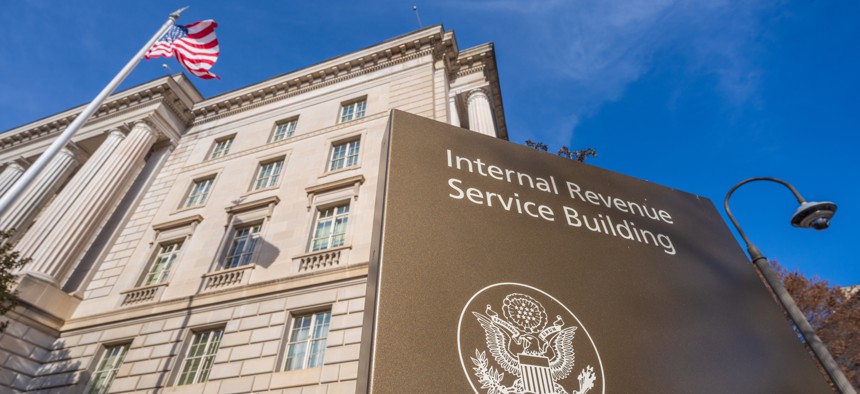
IRS officials plan to hire 20,000 new employees in fiscal 2024, even as they will see funding cuts under a new budget plan. J. David Ake / Getty Images
IRS plans to continue hiring spree despite setback in new budget deal
The agency hopes to hire 20,000 employees in fiscal 2024.
The Biden administration will plow forward with its plan to significantly scale up the Internal Revenue Service workforce despite a new budget deal that has hastened spending reductions aimed at the agency.
A bipartisan framework for fiscal 2024 appropriations agreed by congressional leadership will cut $20 billion from the IRS’ Inflation Reduction Act funds this fiscal year. Initially, that reduction—taken from the $80 billion over 10 years the Democrats’ tax, climate and health care bill originally provided—was intended to be spread out over two years.
Administration officials and Democratic lawmakers expressed confidence, however, the front loading of the reductions will not hamper their ambitious plans to remake the tax agency that had for years and multiple administrations bemoaned its insufficient resources.
IRS plans to hire 20,000 employees in fiscal 2024, boosting its total workforce from its current level of 90,000. The agency had just 79,000 employees on board at the end of fiscal 2022. The Biden administration has said the boosted resources will enable IRS to improve customer service and enforcement on wealthy individuals and corporations.
Ashley Schapitl, a Treasury Department spokesperson, said the adjustments to the timing of the cuts would not have any immediate impact on IRS plans or its hiring goals.
“The IRS has the resources it needs in the near-term to improve customer service and pursue wealthy and corporate tax evaders,” Schapitl said. “Using Inflation Reduction Act resources, the IRS has launched new initiatives to pursue large corporations, complex partnerships and millionaires who don’t pay their tax debts and achieved ambitious goals for filing season 2023 like answering 85% of calls.”
She added, however, that full implementation of the plan would depend on the agency receiving its normal appropriation as part of the annual funding process as well. While the budget deal sets top-line spending levels, appropriators must still agree to line-by-line funding for each agency and program. In their initial fiscal 2024 spending bills, House Republicans sought to cut IRS spending by about 9% while the bipartisan Senate version kept funding flat.
“As Congress considers annual appropriations, the IRS needs resources to support new initiatives to recover the estimated $160 billion in annual tax evasion driven largely by the wealthy,” Schaptil said.
Senate Majority Leader Chuck Schumer, D-N.Y., said on Monday the agreement was a win for IRS as it did not lead to any net increase in cuts for the agency.
“The hard right also wanted to make cuts to the IRS so that ultra-rich tax cheats could weasel their way out of paying their fair share,” Schumer said. “By keeping the cuts at $20 billion, I’m happy to say this agreement will not affect the IRS’s ability to keep holding the richest tax cheats accountable.”
He added “all tools will remain in place” for IRS to conduct additional audits aimed at the wealthy.
Treasury Secretary Janet Yellen similarly told reporters on Monday IRS would not have to make any immediate adjustments to its plans.
"I believe that what's been agreed in this deal is consistent with what is called the Fiscal Responsibility Act when the debt ceiling was raised and some of the revenue was taken away," Yellen said. "But in the short run, certainly medium run, the IRS would be able to continue its important work in modernizing our tax system."
Expediting the cuts into fiscal 2024, however, will reopen the agency to additional reductions during future spending negotiations. Democrats will push to preserve the remaining funding, which the Congressional Budget Office has said generates net revenue due to increased enforcement, but Republicans are likely to again seek to tap into those reserves.
Sen. Ron Wyden, D-Ore., who chairs the Senate Finance Committee that oversees IRS, said on Tuesday he would seek to restore the rescinded funding back to the agency.
“We're gonna beef up our effort to deal with it,” Wyden said.







